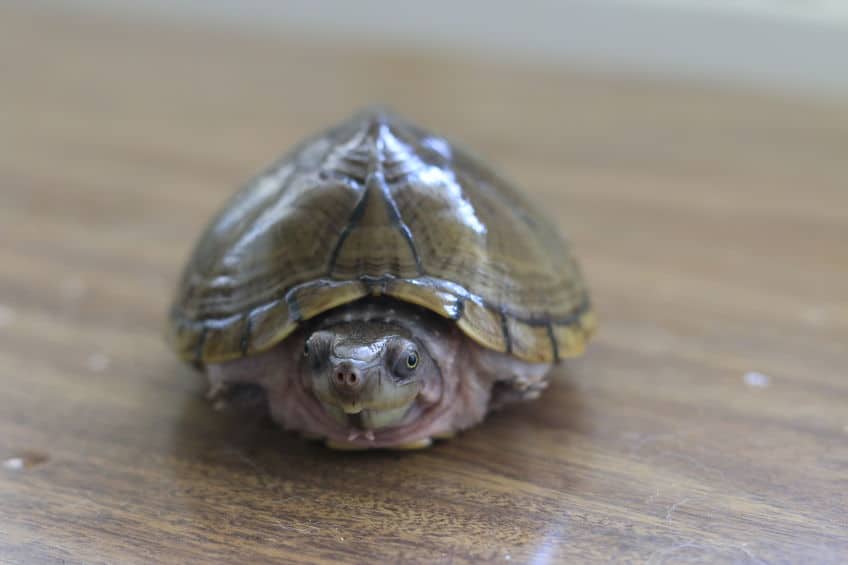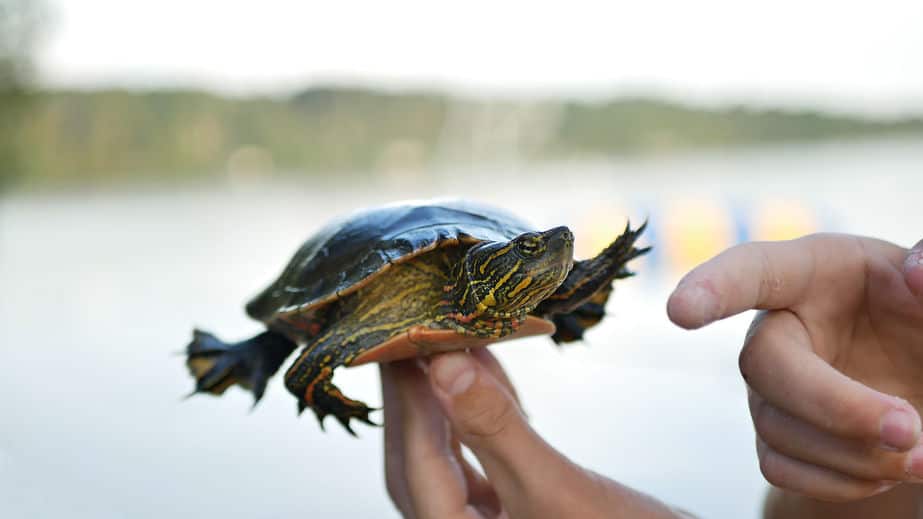Yes, turtles make good pets, but they’re not right for everyone and are a bigger time commitment than most people expect. However, they can be very rewarding pets if you are well prepared to own one. With proper research and preparation, you can ensure the health and longevity of your new pet turtle.
In this guide, you’ll learn:
- Do turtles make good pets?
- Why do they NOT make good pets?
- Which species make good pets?

Important
At ReptileKnowHow, we don’t usually recommend pet turtles for kids as it frequently leads to turtle abandonment, neglect, and often the turtle’s death. However, we do support co-ownership with a parent who is also interested in raising and keeping turtles properly.
Which Turtles Are Good For First-Time Owners?
Mud And Musk Turtles
Mud & musk turtles are small aquatic species that make great pets for those who don’t have much space or time for maintenance since they only reach 4-5 inches in size when fully grown.
Their shells range from dark grayish browns on top with lighter yellowish undersides; some may even have bright orange spots along their carapace! Like other aquatic species, these little guys need plenty of fresh, clean water and access to land areas where they can bask under a heat lamp or UVA/UVB light source for proper health and growth.

Painted Turtles
Painted turtles are a popular choice among reptile enthusiasts due to their beautiful coloring pattern of primarily green hues on the backside and bright yellow stripes running down either side, giving them an almost painted look – hence their name.
This type of turtle grows relatively large, reaching lengths upwards of 8 inches, thus requiring an appropriately sized enclosure capable of housing multiple individuals if desired. Like many others, this variety prefers warmer temperatures between 70°F – 80°F, although slight fluctuations outside this range won’t harm them too much.

Are Turtles Expensive to Own?
Initial Cost of Turtle and Supplies
The initial purchase price of a turtle will vary depending on its species, size, age, and where you buy it from. Generally speaking, turtles range in price from $20-$200 or more.
In addition to the cost of the turtle itself, you’ll need to invest in basic supplies such as a tank or enclosure (which can range anywhere from $50-$500), food ($5-$10 per month), lighting ($15-30) and other accessories like filters or heaters (upwards of $100).
Ongoing Costs for Turtle Care
Beyond just buying your turtle, upfront costs associated with their ongoing care should also be considered.
Depending on your type of setup, additional items may need to be purchased periodically, such as water conditioner ($10/month), substrate ($20/month), or calcium supplements($15/month).
Additionally, some turtles may require live feeder insects, which could add another monthly expense.
Costs Of Veterinary Care
When needed, vet visits typically run around $50 -$150 depending on what tests are required, plus any medications that may need to be prescribed afterward, which could increase this amount significantly.
Before deciding if they make good pets for you, it is important to consider these expenses over time to ensure their health and happiness.
The cost of owning a turtle can vary depending on the type and size. Still, with proper care and maintenance, turtles can be affordable pet.
Can Turtles Make You Sick?
Turtles may be small and cute, but they can pose a health risk if not handled properly. Salmonella is the most common illness associated with pet turtles, as reptiles are known to carry the bacteria in their digestive tracts. Therefore, turtle owners need to take precautions when handling their pets in order to reduce the risk of infection.
Salmonella Risk In Pet Turtles
Turtles, lizards, snakes, and other reptiles are all capable of carrying salmonella bacteria in their digestive tracts without showing any signs or symptoms of illness themselves.
Young children are particularly at risk because they often put objects such as toys or fingers into their mouths after touching a reptile.
To reduce the risk of salmonella contamination from pet turtles, it is important to practice good hygiene habits when handling them. Always wash your hands before and after handling your turtle or cleaning its tank/habitat. Do not let anyone else handle your turtle unless they have also washed their hands.
Additionally, young children under five years old should be discouraged from handling reptiles due to increased susceptibility to infection; instead, teach them how to observe safely from a distance while you care for your pet turtle yourself.
FAQs
Is a turtle a good house pet?
Turtles can make great house pets for the right person. They require a significant amount of care and attention, but they can be rewarding companions with proper research and dedication. Turtles need an appropriate habitat to thrive, including access to clean water, UVB lighting, and a balanced diet.
Do turtles love their owners?
It is difficult to definitively answer whether or not turtles love their owners. Turtles are generally solitary animals, so they may not show the same affection as other pets. However, many turtle owners report that their pet turtles recognize them and become more active when they enter the room.
What is the most popular turtle for a pet?
The Red-Eared Slider is one of the most popular and friendliest turtles for a pet. They are relatively easy to care for, have an attractive appearance, and can live up to 40 years with proper care. They require a large tank with adequate filtration and UVB lighting, but they are generally quite hardy creatures that make great pets.


